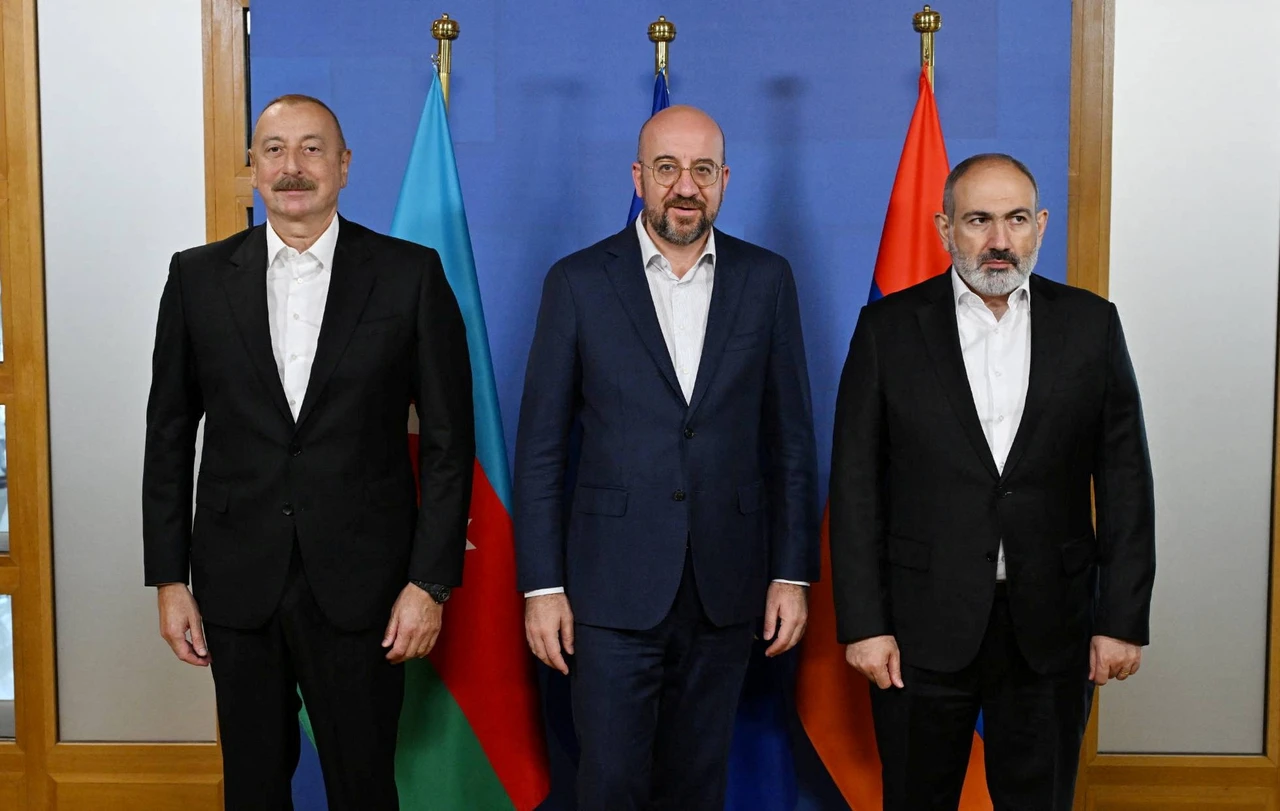Azerbaijan pushes for access and agreement in peace talks with Armenia
 Azerbaijan's President Ilham Aliyev, Armenia's Prime Minister Nikol Pashinyan and President of the European Council Charles Michel pose for a picture during a meeting in Brussels, (Reuters Photo)
Azerbaijan's President Ilham Aliyev, Armenia's Prime Minister Nikol Pashinyan and President of the European Council Charles Michel pose for a picture during a meeting in Brussels, (Reuters Photo)
One year after Azerbaijan’s decisive military action to reclaim the separatist region of Nagorno-Karabakh, the nation is pushing for key agreements in ongoing peace talks with Armenia, focusing particularly on transportation access and border demarcation.
In a swift military campaign last year, Azerbaijan reasserted control over Nagorno-Karabakh, a mountainous territory with a predominantly ethnic Armenian population that had declared independence three decades earlier.
Following the offensive, nearly the entire population of approximately 120,000 fled to Armenia. This situation has been framed by Azerbaijani officials as a necessary step to restore order and governance in a region they consider integral to their territory.
In the aftermath of the conflict, Armenia has engaged in dialogue with Azerbaijan, signaling a shift in its approach after feeling abandoned by its traditional ally, Russia. While some voices within the Armenian diaspora have sought accountability for what they term ethnic cleansing, Azerbaijani leaders emphasize the importance of constructive dialogue to prevent further violence.
At the recent UN General Assembly, the foreign ministers of Azerbaijan and Armenia met with their Western counterparts, marking a departure from earlier discussions characterized by mutual accusations. U.S. Secretary of State Antony Blinken and French officials are expected to facilitate dialogue aimed at advancing peace efforts.
Azerbaijan’s ambassador in Paris, Leyla Abdullayeva, noted that the two countries have reached consensus on nearly 80% of a draft peace treaty, but significant unresolved issues remain. “The outstanding issues cannot be swept under the rug,” she stated, highlighting Azerbaijan’s commitment to a fair and lasting agreement.
A central issue is Azerbaijan’s demand for a transportation corridor to its exclave of Nakhchivan, which is separated from the rest of Azerbaijan by Armenian territory. This access is essential for establishing a land link to Turkey, a key ally. Additionally, Azerbaijan seeks the removal of Armenia’s constitutional provision aimed at unifying with Nagorno-Karabakh, viewing this as a significant barrier to achieving lasting peace.
While Western diplomats have expressed skepticism regarding some of Azerbaijan’s demands, the country remains firm in its position that constitutional changes in Armenia are necessary for moving forward. This process would require a referendum, potentially lengthening negotiations.
The upcoming COP29 climate conference in Baku this November could serve as a catalyst for renewed dialogue. Azerbaijani officials are optimistic that the international community will recognize their commitment to peace. In Washington, Senator Ben Cardin has urged President Ilham Aliyev to release political prisoners and Armenian detainees before the conference, framing it as an opportunity for accountability and progress.



